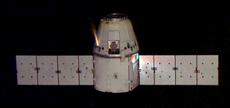Draco thruster

A SpaceX Dragon spacecraft approaching the International Space Station fires one of its 18 Draco thrusters.
|
|
| Country of origin | United States |
|---|---|
| Manufacturer | SpaceX |
| Application | Reaction control system |
| Liquid-fuel engine | |
| Propellant | NTO / MMH |
| Performance | |
| Thrust (vac.) | 400 N (90 lbf) |
| Isp (vac.) | 300s |
| Used in | |
| SpaceX Dragon | |

SuperDraco firing at full thrust
|
|
| Country of origin | United States |
|---|---|
| Manufacturer | SpaceX |
| Application | LAS (Launch Abort System), powered landing |
| Status | Development |
| Liquid-fuel engine | |
| Propellant | NTO / MMH |
| Performance | |
| Thrust (SL) | 73 kN (16,400 lbf) |
| Isp (SL) | 235s |
| Burn time | 25 seconds |
| Propellant capacity | 1,388 kg (3,060 lbs) |
| Used in | |
| Crew Dragon, DragonFly test vehicle | |
Draco is a family of hypergolic liquid rocket engines designed and built by SpaceX for use in their launch vehicles and space capsules. Two engine types have been built to date: Draco and SuperDraco.
The original Draco thruster is a small rocket engine for use on the Dragon spacecraft. These engines were also used on early Falcon 9 upper stages to provide attitude control, but more recent versions now use nitrogen cold gas thrusters in place of Dracos.
SuperDraco is derived from Draco, and utilizes the same storable (non-cryogenic) propellant as the small Draco thrusters, but are over 100 times larger in terms of delivered thrust. The much larger SuperDraco engines will be used on later versions of the Dragon spacecraft to provide launch-escape capability on crew transport flights to low Earth orbit, as well as entry, descent and landing control of the proposed Red Dragon robotic probe to Mars.
Draco thrusters generate 400 newtons (90 pounds-force) of thrust using a storable propellant mixture of monomethyl hydrazine fuel and nitrogen tetroxide oxidizer. The Draco thrust is comparable to the Marquardt R-4D engine developed for the Apollo Service and Lunar Modules in 1960s and used for apogee/perigee maneuvers, orbit adjustment, and attitude control.
...
Wikipedia
